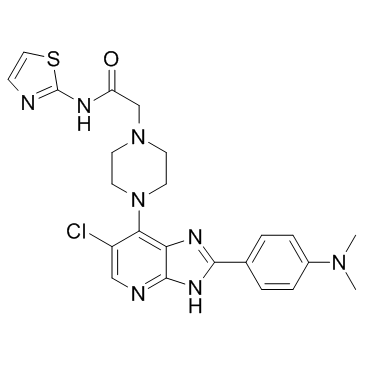942947-93-5
| Name | 2-[4-[6-chloro-2-[4-(dimethylamino)phenyl]-1H-imidazo[4,5-b]pyridin-7-yl]piperazin-1-yl]-N-(1,3-thiazol-2-yl)acetamide |
|---|---|
| Synonyms |
2-(4-{6-chloro-2-[4-(dimethylamino)phenyl]-3H-imidazo[4,5-b]pyridin-7-yl}piperazin-1-yl)-N-(1,3-thiazol-2-yl)acetamide
S1519_Selleck cc-472 1-Piperazineacetamide,4-(6-chloro-2-(4-(dimethylamino)phenyl)-3H-imidazo(4,5-b)pyridin-7-yl)-N-2-thiazolyl 2-(4-{6-Chloro-2-[4-(dimethylamino)phenyl]-1H-imidazo[4,5-b]pyridin-7-yl}-1-piperazinyl)-N-(1,3-thiazol-2-yl)acetamide CCT129202 |
| Description | CCT 137690 is an aurora kinase inhibitor with IC50s of 42, 198, and 227 nM for aurora A, B and C, respectively. |
|---|---|
| Related Catalog | |
| Target |
Aurora A:142 nM (IC50) Aurora B:198 nM (IC50) Aurora C:227 nM (IC50) |
| In Vitro | CCT129202 causes the accumulation of human tumor cells with z4N DNA content, leading to apoptosis. CCT129202 is found to induce apoptosis with GI50 values that ranges between 0.08 and 1.7 μM. CCT120202-treated human tumor cells shows a delay in mitosis, abrogation of nocodazole-induced mitotic arrest, and spindle defects. CCT129202 Causes p21Up-regulation, Rb Hypophosphorylation, and H2F-DependentTK1Down-regulation[1]. |
| In Vivo | Growth of HCT116 xenografts in nude mice is inhibited after i.p. administration of CCT129202. p21, the cyclin-dependent kinase inhibitor, is induced by CCT129202. Up-regulation of p21 by CCT129202 in HCT116 cells led to Rb hypophosphorylation and E2F inhibition, contributing to a decrease in thymidine kinase 1 transcription[1]. |
| Cell Assay | The effects of CCT129202 on cell proliferation are analyzed with the MTT assay. Cells are plated in 96-well plates at 2,500 per well and are treated with a range of 0 to 50 μM of CCT129202 for 72 h. The absorbance is measured at 570 nm[1]. |
| Animal Admin | Mice: For efficacy studies, human HCT116 colon carcinoma xenografts are established in female mice. CCT129202 is dissolved in DMSO and injected i.p in vehicle, which comprises 10% DMSO, 5% Tween 20, and 85% sterile saline at 0.1 mL/10 g body weight. Dosing with CCT129202 commenced when tumors are well established (f5 mm mean diameter); control animals receive an equivalent volume of vehicle. Mouse body weights and condition are monitored throughout the study. Tumors are measured thrice weekly[1]. |
| References |
| Density | 1.4±0.1 g/cm3 |
|---|---|
| Molecular Formula | C23H25ClN8OS |
| Molecular Weight | 497.016 |
| Exact Mass | 496.156067 |
| PSA | 125.01000 |
| LogP | 4.94 |
| Index of Refraction | 1.719 |
| Storage condition | -20℃ |
